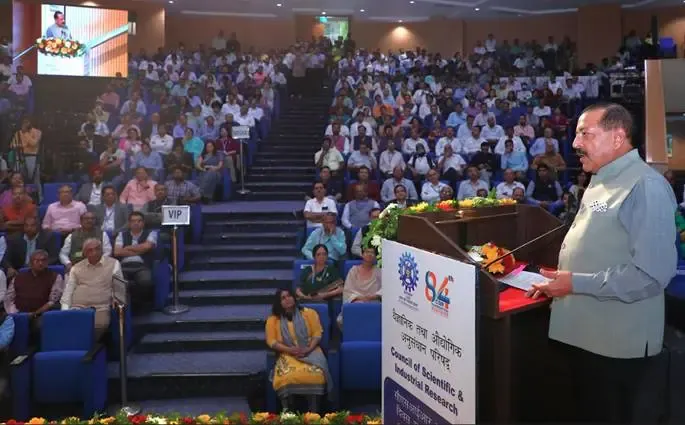Will Technology Sovereignty Determine Geopolitical Power?

Synopsis
Key Takeaways
- Technology sovereignty is essential for geopolitical power.
- CSIR's contributions are pivotal in various sectors.
- Collaboration between industries and researchers is crucial.
- Technological advancements enhance national security.
- Effective communication with the public is vital for scientists.
New Delhi, Sep 26 (NationPress) Union Minister of State for Science and Technology and Vice President of CSIR, Dr. Jitendra Singh, emphasized on Friday that the future of geopolitical sovereignty will largely hinge on technology sovereignty. During the 84th Foundation Day celebration of the Council of Scientific and Industrial Research (CSIR), he underscored India’s evolution into a technology-centric nation while advocating for the conscious development of emerging technologies to maintain global competitiveness.
“In the near future, technology sovereignty will play a crucial role in determining a nation’s geopolitical standing,” Dr. Singh stated, reinforcing India’s shift towards becoming a technology-driven country.
He noted that CSIR, with its 37 laboratories nationwide, has been instrumental in various domains including healthcare, pharmaceuticals, agriculture, materials, and defense.
Reflecting on CSIR’s history since its inception in 1942, Dr. Singh acknowledged the pivotal contributions of leaders such as Dr. Syama Prasad Mookerjee and Sir Ramnath Chopra, who were instrumental in laying the groundwork for pharmaceutical research in India.
“The legacy of CSIR is a testament to the fact that science and innovation were integral to India’s progress even before Independence,” Dr. Singh remarked.
The Minister pointed out that recent advancements, like the domestically developed antibiotic Nafithromycin, highlight the significance of collaboration between CSIR and various scientific bodies.
He also stressed the importance of industrial partnerships in transitioning innovations from laboratories to commercial markets.
By citing examples such as lavender farming in Jammu and Kashmir and tulip innovations in Palampur, Dr. Singh demonstrated how CSIR’s initiatives have enhanced farmers’ earnings and positively impacted society.
Furthermore, he noted that technologies developed by CSIR have contributed to national security, including the sensors utilized in Operation Sindoor.
Looking forward, Dr. Singh outlined a threefold strategy of awareness, affordability, and accessibility to ensure that scientific advancements benefit all segments of society.
He called upon scientists to leverage modern communication platforms and social media to engage with the public and effectively showcase their work.









